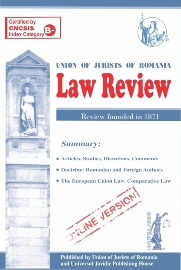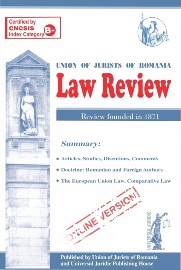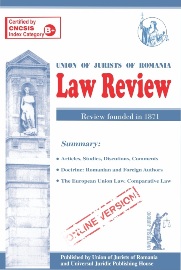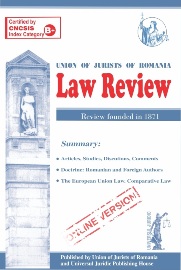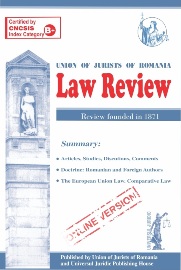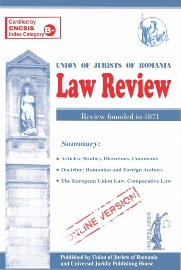Author(s): Adina Buciuman / Language(s): French
Issue: 01/2016
L’étude se propose l’analyse du potentiel créateur d’obligations juridiques de l’engagement unilatéral. Variante de l’acte de formation unilatérale, l’engagement unilatéral est défini comme la manifestation unilatérale de volonté faite en vue de la création d’une obligation juridique contre son auteur. Même si la définition est rapportée à celle du contrat, acte de formation bilatérale, elle ne permet pas la visualisation de l’engagement unilatéral par une simple réduction à l’unité des règles qui gouvernent la matière contractuelle. L'une des questions les plus épineuses du droit des obligations, la reconnaissance du potentiel générateur d'obligations de l'engagement unilatéral, se construit à l'ombre de la plus vaste problématique des valences juridiques de la volonté. À une époque qui établit comme desideratum l'unification des modèles ou, du moins, de l'identification de la meilleure solution, dans une législation moderne, ouverte même à l'abandon de traditions de siècles, il s'impose d'étudier le problème au niveau de ses fondements. L’ouvrage présente les prémisses historico-philosophiques des deux orientations opposées, qui caractérisent les deux grands systèmes juridiques continentaux, français et allemand, quant au rôle de la volonté dans la production des effets de droit. Le degré d’importance reconnue à la volonté interne, réelle, respectivement à la volonté déclarée, extériorisée, conduit aux visions différentes sur l’admissibilité de l’engagement unilatéral comme source d’obligations : réticence ou même hostilité dans le droit français, respectif faveur de principe dans le droit allemand. L’analyse comparatiste conclu que, au niveau des solutions pratiques, les deux systèmes ne sont en réalité si différents. Le Code civil roumain de 2009 suggère un grand saut vers la modernité, car il paraît admettre avec valeur de principe la force obligatoire de l’engagement unilatéral. L’auteur critique sans hésitation une telle solution, en soutenant que la seule interprétation admissible en vue d’assurer la cohérence du système juridique est celle conformément à laquelle le texte de l’art. 1327 du Code civil 2009 ne fait qu’énoncer la possibilité que, dans les cas prévus par la loi, la volonté unilatérale puisse participer à la création des obligations contre son émetteur. La naissance d’une obligation reste cependant toujours tributaire à l’existence d’une norme juridique. Elle peut être soit une norme de droit positif, qui détermine les conditions dans lesquelles l’auteur de la manifestation unilatérale de volonté peut être obligé à effectuer une prestation, soit une norme de droit naturel, l’obligation naturelle, que l’engagement unilatéral transpose dans l’ordre du droit positif, en lui donnant ainsi caractère obligatoire. La solution proposée est soutenue aussi avec des arguments de technique juridique. L’ouvrage fait l’analyse des mécanismes juridique véhiculés pour illustrer la transformation de l’obligation naturelle en obligation civile, pour conclure que l’engagement unilatéral est le seul adéquat en ce sens. La juridicité de l’obligation naturelle préexistante fait que l’engagement unilatéral se limite ici aussi à un rôle attributif d’efficacité juridique, ce qui l’exclut de la catégorie des sources créatrices d’obligations juridiques.
More...
